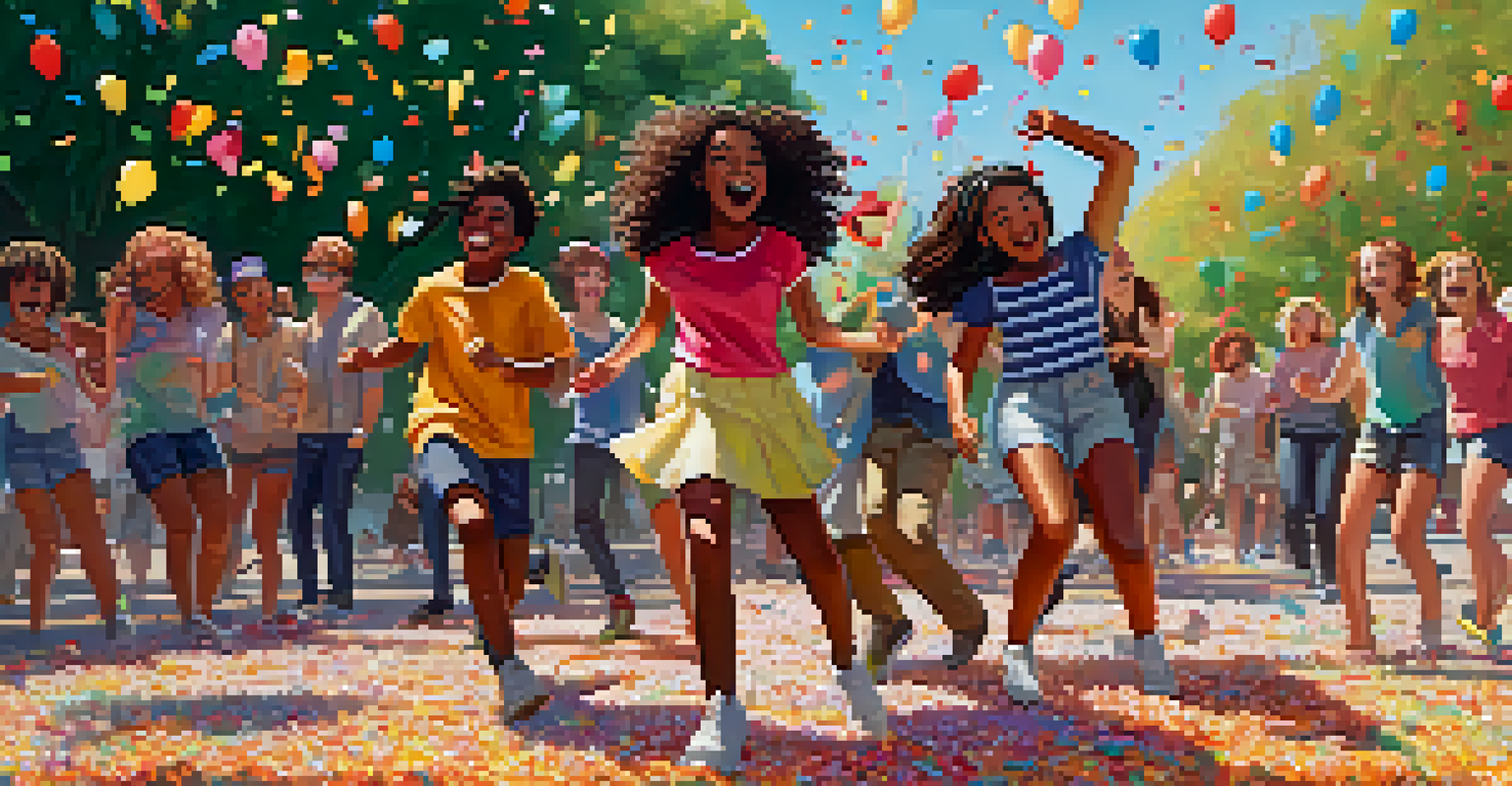The Influence of Music on Youth-Centric Film Storytelling

The Role of Music in Setting Emotional Tone
Music is a powerful tool that filmmakers use to establish the emotional tone of a film. Think about your favorite youth-centric films; the music often resonates deeply, amplifying feelings of joy, sadness, or nostalgia. For instance, a heartwarming scene might feature a soft acoustic guitar, creating a comforting atmosphere that draws the audience in.
Music can change the world because it can change people.
Moreover, music acts as a form of storytelling in itself, guiding viewers through the emotional landscape of the narrative. When a character experiences a pivotal moment, the musical score can shift dramatically, making the audience feel that change alongside the character. This connection is essential in youth films, where emotions run high and experiences are often new and intense.
Ultimately, the right music can make or break a scene, transforming a simple moment into a memorable experience. By carefully selecting tracks that align with the film's themes, filmmakers can create a lasting impact, ensuring that the story lingers with viewers long after the credits roll.
Music as a Character in Youth-Centric Films
In many youth-centric films, music is not just a background element; it becomes a character of its own. Consider movies like 'Guardians of the Galaxy,' where the soundtrack is integral to the storytelling, shaping the protagonist's identity and journey. The music reflects the characters’ personalities and serves as a narrative device, revealing their inner worlds.

This unique approach allows filmmakers to engage young audiences who often relate to music on a personal level. For many teens, songs can evoke memories, feelings, and experiences, making the story more relatable and impactful. When characters sing or dance to a popular song, it creates a powerful connection that resonates with young viewers.
Music Sets Emotional Tone in Films
Filmmakers use music to enhance emotional experiences, making scenes resonate deeply with audiences.
By treating music as a character, filmmakers can also explore themes of rebellion, friendship, and self-discovery, which are prevalent in youth narratives. This technique not only enhances the emotional depth of the film but also helps to forge a strong bond between the audience and the characters.
Cultural References and Trends in Soundtracks
Music in youth-centric films often reflects the cultural trends and social movements of the time. By incorporating popular songs and artists, filmmakers create a sense of authenticity and relevance that resonates with young audiences. For example, films like 'The Breakfast Club' and 'Clueless' are iconic partly due to their memorable soundtracks that encapsulate the eras they represent.
Without music, life would be a mistake.
These soundtracks serve as a time capsule, capturing the spirit of youth culture and making the film more relatable to its audience. When young viewers hear songs from their favorite films, they’re often transported back to the emotions and experiences associated with those moments. This connection is powerful, as it solidifies the film’s place in the cultural landscape.
Moreover, trends in music can influence the themes and messages explored in these films. By highlighting contemporary issues through song choices, filmmakers can address topics like mental health, identity, and social justice, fostering important conversations among young viewers.
Creating Memorable Moments with Musical Scores
A well-crafted musical score can transform ordinary scenes into unforgettable moments in youth-centric films. Think of the iconic score from 'Harry Potter' or the uplifting melodies in 'The Lion King.' These scores not only enhance the visual experience but also evoke strong emotions, drawing viewers deeper into the story.
Filmmakers often collaborate with composers to create original scores that reflect the film's themes and characters. This bespoke approach allows for a tailored emotional experience, ensuring that each note resonates with the audience. For instance, a suspenseful score can heighten tension during a crucial scene, making the stakes feel even higher.
Music as a Character in Stories
In youth-centric films, music often becomes a vital character, reflecting personalities and enhancing narrative depth.
Additionally, these scores often become beloved by fans, leading to a lasting legacy beyond the film itself. Many young viewers find themselves humming these melodies long after watching, which further cements their connection to the film and its characters.
The Impact of Lyrics on Storytelling
When songs with lyrics are included in youth-centric films, they often serve as a narrative device that enhances the storytelling. Lyrics can encapsulate a character’s feelings or foreshadow events, adding layers of meaning to the visuals. For example, a song about heartbreak playing during a pivotal breakup scene can deepen the emotional impact.
This technique invites viewers to engage with the narrative on a more profound level, as they interpret the lyrics in relation to the story. Young audiences, particularly, often find solace in songs that articulate their feelings, making the film experience more personal and relatable. This is why soundtracks featuring poignant lyrics resonate with many adolescents navigating complex emotions.
Moreover, the use of lyrical music can encourage discussions around themes like love, loss, and identity, fostering a sense of community among viewers. When young people relate to a song’s message, it often leads to shared experiences and conversations, amplifying the film’s impact.
The Role of Music in Marketing Youth Films
Music plays a significant role in the marketing of youth-centric films, often serving as a key promotional tool. Catchy soundtracks and popular artists can draw in younger audiences, making films more appealing. For example, trailers that feature trending songs can create buzz and excitement, leading to higher box office numbers.
Additionally, music videos for the film's soundtrack can extend the film’s reach, captivating audiences on platforms like YouTube and TikTok. These videos often feature clips from the film, enticing viewers to see the movie while enjoying a song that resonates with them. This cross-platform promotion is particularly effective in reaching the youth demographic.
Cultural Trends Shape Soundtracks
Incorporating popular songs and artists helps youth films connect authentically with contemporary cultural movements.
By strategically selecting songs that align with the film's themes, marketers can create a cohesive brand identity that appeals to young viewers. This not only helps in drawing audiences to theaters but also fosters a lasting connection between the film and its soundtrack.
Future Trends: The Evolution of Music in Film
As technology continues to evolve, so does the role of music in youth-centric films. Streaming services and social media platforms are changing how films are marketed and how audiences consume music related to these films. For instance, playlists on Spotify or Apple Music can promote soundtracks, making them accessible to a broader audience.
Furthermore, the rise of independent filmmakers is leading to innovative approaches to music in storytelling. Many indie films are now featuring lesser-known artists, giving them a platform while also creating unique soundscapes that enhance the narrative. This trend allows for more diverse musical influences and styles within youth films.

Additionally, as audiences become more involved with the filmmaking process—through social media and fan interactions—there’s potential for viewer input on soundtrack choices. This evolving landscape promises to bring exciting new directions for music in youth-centric storytelling, ensuring that it remains a vital component of film.